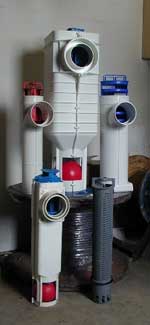|
Effluent Filters The purpose of a septic tank is to retain the solid waste and keep it from flowing out into the septic drain field. In a properly operating system, only the liquid from the tank is allowed to seep into the soil through the septic drain field. To help keep solids from flowing out of the tank, some newer systems incorporate septic effluent filters for filtering the water as it leaves the tank. Septic tanks are normally full of liquid and waste all the time. Most septic tanks have three basic layers of waste. Scum, which includes debris such as grease, settles at the top and floats on the liquid. Liquids will settle in the center, while the heavier solids settle to the bottom. The inlet and outlet pipes are designed so that their openings are in the area of the tank normally containing liquids – this helps to keep solids and scum from entering the septic drain field. As new waste and liquids enter the system, the liquid near the center of the tank is pushed out into the septic drain field. |
 |
|
Septic tanks need to be pumped on a regular basis to remove the accumulated solids and other debris. The frequency of required cleaning will depend on the size of the tank and the number of people living in the home. What is an Effluent Filter? Effluent filters go inside the tank and take the place of the exit baffle. Any water leaving the tank must first go through this filter. Effluent filters are designed to prevent larger solids from leaving the tank and plugging up the drain field. Why use an Effluent Filter? An effluent filter keeps you drain field clear of solids. They keep solids in the septic tank so they won’t damage your treatment or disposal system. A filter is relatively inexpensive. Replacing a plugged-up drain field can be very expensive. How do you choose an Effluent Filter? All filters need cleaning eventually, just as all tanks will need to be pumped. The smaller opening size and the smaller the flow area the more often the effluent filter needs to be cleaned. Flow area – the combined area of the perforations, or openings in the filter, through which liquid passes- must be sufficient or the filter will clog easily. As you make your selection based on the manufacturer’s specifications, be honest with yourself – are you willing to clean a septic tank filter every six months or does five years sound more reasonable? We Can Help We stock POLYLOK and TUF-TITE Effluent Filters and a limited supply of ZABEL filters. We are confident we can help with your effluent filter needs, if we don’t have it, we can get it. If you have any questions, please give us a call.
|
|